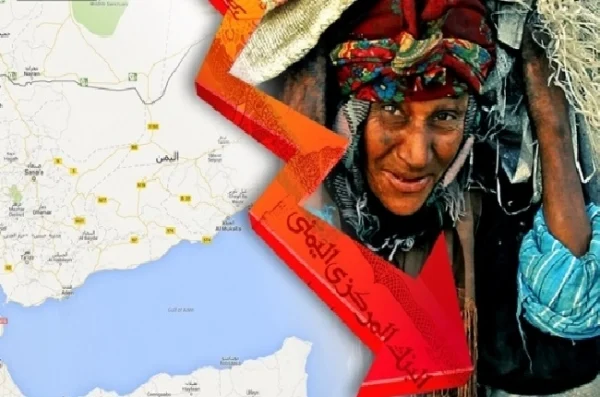كيف تبدو تبعات خفض التصعيد الاقتصادي في اليمن؟
اقتصاد | 26 يوليو, 2024 - 11:20 ص
يمن شباب نت- متابعات

الأمم المتحدة: الاقتصاد اليمني على وشك الانهيار الكامل
 الجيش ينشر أسماء شهداء الواجب الوطني الذين استشهدوا في المنطقة العسكرية الأولى
الجيش ينشر أسماء شهداء الواجب الوطني الذين استشهدوا في المنطقة العسكرية الأولى  رئيس الأركان يتفقّد جرحى المنطقة العسكرية الأولى في مستشفيات مأرب
رئيس الأركان يتفقّد جرحى المنطقة العسكرية الأولى في مستشفيات مأرب  "الهروب إلى الموت".. تقرير يوثق انتهاكات جسيمة بحق المهاجرين عبر اليمن
"الهروب إلى الموت".. تقرير يوثق انتهاكات جسيمة بحق المهاجرين عبر اليمن  مانشستر سيتي ينتصر على وست هام وينتزع الصدارة مؤقتاً
مانشستر سيتي ينتصر على وست هام وينتزع الصدارة مؤقتاً  من الهدوء إلى ساحة الصراع: كيف فجّر التنافس السعودي–الإماراتي جبهة حضرموت والمهرة؟
من الهدوء إلى ساحة الصراع: كيف فجّر التنافس السعودي–الإماراتي جبهة حضرموت والمهرة؟  المخلافي يحذر من خطورة العبث بالمصالح المشتركة بين اليمن والسعودية
المخلافي يحذر من خطورة العبث بالمصالح المشتركة بين اليمن والسعودية 
 الجيش ينشر أسماء شهداء الواجب الوطني الذين استشهدوا في المنطقة العسكرية الأولى
الجيش ينشر أسماء شهداء الواجب الوطني الذين استشهدوا في المنطقة العسكرية الأولى  رئيس الأركان يتفقّد جرحى المنطقة العسكرية الأولى في مستشفيات مأرب
رئيس الأركان يتفقّد جرحى المنطقة العسكرية الأولى في مستشفيات مأرب  "الهروب إلى الموت".. تقرير يوثق انتهاكات جسيمة بحق المهاجرين عبر اليمن
"الهروب إلى الموت".. تقرير يوثق انتهاكات جسيمة بحق المهاجرين عبر اليمن  مانشستر سيتي ينتصر على وست هام وينتزع الصدارة مؤقتاً
مانشستر سيتي ينتصر على وست هام وينتزع الصدارة مؤقتاً  من الهدوء إلى ساحة الصراع: كيف فجّر التنافس السعودي–الإماراتي جبهة حضرموت والمهرة؟
من الهدوء إلى ساحة الصراع: كيف فجّر التنافس السعودي–الإماراتي جبهة حضرموت والمهرة؟  المخلافي يحذر من خطورة العبث بالمصالح المشتركة بين اليمن والسعودية
المخلافي يحذر من خطورة العبث بالمصالح المشتركة بين اليمن والسعودية 
اقتصاد | 26 يوليو, 2024 - 11:20 ص
يمن شباب نت- متابعات

الأمم المتحدة: الاقتصاد اليمني على وشك الانهيار الكامل